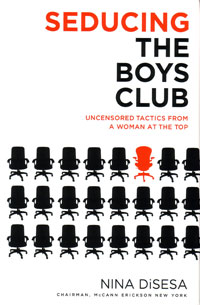Seducing the Boys Club
Seducing the Boys Club
Uncensored Tactics from a Woman at the Top
By Nina DiSesa

What To Expect When Women Work In Boys Clubs
When you start working right after college, you may not notice any gender inequities immediately, unless you get an interim job at Hooters or some place like that, God help you. You may not notice it for several years. Maybe never if you don’t choose a field that still lives in the world of male chauvinism. But sooner or later you may find yourself in a male-dominated world and when that happens you need to prepare yourself.
A boys club is not a level playing field. There is a double standard with almost everything you will do: the way you dress, the way you talk, the way you work – you will be measured differently against the men doing the same job. Very often you won’t even notice that this is happening. Women need to recognize that fact, get over it and then decide how to deal with it and prevail.
For the most part, in a boys club the rules are written to give a distinct advantage to men over women in terms of getting to the top. Therefore, it’s not easy to succeed in these clubs, unless you are a special kind of woman. At some point in your career you will be passed over for promotions and career-building opportunities for the simple reason that you are not a man.
That doesn’t mean you shouldn’t work in a boys club. They can be very fun, stimulating, and even rewarding environments, if you can get what you want.
You need to recognize the four stages we go through as we deal with the gender inequities of being a woman in a man’s world. They’re almost like the stages we go when mourning a death or a broken relationship.
The Four Stages of Gender-Equality Mourning
Ignorance – When we start out in business we are oblivious to the gender inequities. First of all, at the entrance level everyone is treated the same and women are treated no worse than the men. We are unaware that the man sitting next to us — doing the same job, with the same experience, often not even as skilled as we are – is making more money that we are. We know this when he decides to boast about his big raise, or we – in a moment of incredible stupidity – ask him what he makes. Then we move to stage two.
Anger and Resentment – Okay, now we hate everyone. We hate the men we work with and the ones we work for. We hate the men we meet in bars. We hate nice men and rogues equally. We hate the firm. We hate the double standard. We hate our office. We hate our hair. We are filled with hate. This is normal, but it is self-destructive, and we have to get past this stage as soon as is humanly possible. Many women never move on and stay trapped in these feelings. The determined women progress to stage three.
Denial – We are not going to let the bastards beat us. We will work harder, longer, more diligently and we will prove beyond a shadow of a doubt that we are as good as the men, if not better, and we deserve to be respected, cherished and promoted. This is okay, but if we spend too much time denying the existence of the double standard our careers are stalled and we never make it to the top. Best to get to stage four quickly.
Taking Control – At some point, before it’s too late, we need to figure out how to win in a boys club. The problem is that we don’t always know how to fit into a man’s work world. Men see us as unfamiliar, foreign beings they don’t really understand, and as a result, they don’t feel comfortable with us. The failure to succeed with them is partially our fault. This is good news. Pilot error is something we can control. Although we can’t directly change men’s behavior, we can change the way we behave, and that can alter the way men feel about us.
Understanding The Men In Your Life
In order to make it in a boys club, you have to understand the very people who would hold you back. That would be men. You must learn how they operate in business and decide which of their traits you should emulate. What do you have to do in order to win their respect and turn them into supporters?
What is the one thing “the boys” look for when they are deciding whom they will admire, support and promote?
They look for themselves!
Men feel comfortable with their own kind, and the more someone reminds a man of himself, the more comfortable he is. If we want to win them over we have to be more like them. We have to recognize their good qualities and the skills that have made them successful. Things like being decisive, focused, and willing to take risks while somehow having fun throughout the process. And you must learn to take credit for your successes like they do.
I hear women deflecting glory all the time. Someone tells them they did a bang-up job and they say things like:
“I had a great team on my side.”
No kidding. Who doesn’t have a great team?
“I couldn’t have done it alone.”
No kidding. No one does anything alone in business.
“My team deserves all the credit.”
Ouch, ouch, ouch, ouch OUCH!
What does a man say when someone tells him he did a great job?
A man says, “Thank you.”
Stand in front of a mirror and practice saying these words over and over again until it becomes second nature:
“Thank you.”
“Thank you, I’m very happy to have contributed.”
“Thank you. Thank you very much.”
“It was a lot of work but I’m glad it paid off.
If you can tap into your “male” side and not lose any of your wonderfully unique “female” skills you can win at this game. Most men can’t, won’t, or don’t know how to get in touch with their “female” side, and this puts them at a distinct disadvantage. They don’t listen well, they don’t have empathy, they’re not nurturing and they think multi-tasking is another word for being unfocussed. All of these distinctly female skills are great assets in business if used correctly.
The most helpful things I discovered on my journey to the top of an ad agency were little secrets and insights about understanding and managing men. My first epiphany came to me when I was married to a crabby, Italian actor. He was Sicilian and he was raised to believe that men were gods and gods didn’t wash dishes or help around the house. But I was working a fulltime job and doing all the shopping, cooking and cleaning was getting me down. If I asked him to help it would end up in a fight – I was emasculating him.
One day I bought a heavy duty vacuum cleaner (we had a cat), but within a week I told him I had to return it. He asked why and I said, “It’s too heavy for me. I can’t manage it.” And he said . . . guess what he said.
“I’ll do it.”
That first generation, first son, macho Sicilian man vacuumed our apartment for the two remaining years we were married. He always did it when I was home so I could tell him how strong he was. Once or twice he even cooked dinner. You’d be dismayed at how I drooled over these two meals, trying to get him to cook more often.
In business it’s no different. We have to seduce them without sex and manipulate them without malice. And we must like them. If we play our hand correctly, we can work alongside the men as equals, and when the time comes, protect them, lead them to greatness and even make them better men — at least the ones who need to be better.
This requires effort and patience, but deep down we are biologically wired to succeed. We have the natural talents for some of it; the rest we can learn. All you need to do is break some of those time-honored rules along the way. They weren’t working for us anyway.
The sooner you realize this the happier you will be.
Nina DiSesa was Chairman of McCann Erickson’s flagship New York office, part of McCann Worldgroup, the largest marketing services network in the world. She is also the author of “Seducing the Boys Club,” published by Ballantine Books, an imprint of Random House.
Excerpted from SEDUCING THE BOYS CLUB: Uncensored Tactics From a Woman at the Top by Nina DiSesa. © 2008 by Nina DiSesa. Reprinted with permission from The Random House Publishing Group.
Nina DiSesa
Copyright © 2008, Ballantine Books. All rights reserved.






